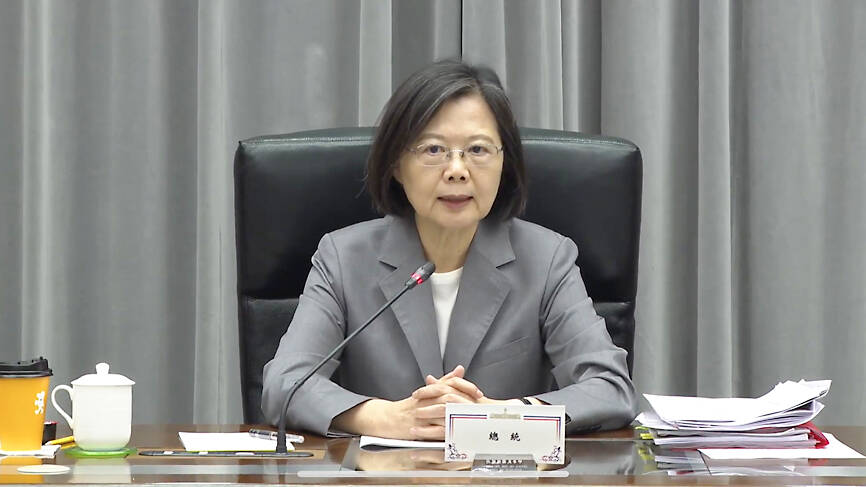President Tsai Ing-wen (蔡英文) said yesterday that the defense spending would reach a record NT$606.8 billion (US$19 billion) in 2024, a demonstration of the nation’s “determination to ensure national security”.
Tsai said in a statement that the defense spending was “expected to reach 2.5 percent of the GDP.”
The proposed spending would be a 3.5 percent increase from 2023’s NT$586.3 billion, according to official data.

Photo courtesy of the Presidential Office
“Taiwan must continue to bolster its capabilities to defend itself and demonstrate its self-defence determination to ensure national security and interests, while seeking more international support,” she said.
Tsai was briefed by Premier Chen Chien-jen (陳建仁) about the 2024 government budget.
More details on the proposed 2024 budget -- the last of Tsai’s tenure -- are expected to be released after it is presented at a Cabinet meeting on Thursday.
Following approval by the Cabinet, the budget will also be debated and voted on by the Legislative Yuan.
Beijing has intensified its sabre-rattling and ramped up political and economic pressure on Taiwan since Tsai came to power in 2016.
China staged fresh drills around the island on Saturday, a day after Vice President William Lai (賴清德), also a frontrunner in next year’s presidential election, returned from a visit to Paraguay that included stopovers in the US.
Additional reporting by CNA

South Korean K-pop girl group Blackpink are to make Kaohsiung the first stop on their Asia tour when they perform at Kaohsiung National Stadium on Oct. 18 and 19, the event organizer said yesterday. The upcoming performances will also make Blackpink the first girl group ever to perform twice at the stadium. It will be the group’s third visit to Taiwan to stage a concert. The last time Blackpink held a concert in the city was in March 2023. Their first concert in Taiwan was on March 3, 2019, at NTSU Arena (Linkou Arena). The group’s 2022-2023 “Born Pink” tour set a

CPBL players, cheerleaders and officials pose at a news conference in Taipei yesterday announcing the upcoming All-Star Game. This year’s CPBL All-Star Weekend is to be held at the Taipei Dome on July 19 and 20.

The Taiwan High Court yesterday upheld a lower court’s decision that ruled in favor of former president Tsai Ing-wen (蔡英文) regarding the legitimacy of her doctoral degree. The issue surrounding Tsai’s academic credentials was raised by former political talk show host Dennis Peng (彭文正) in a Facebook post in June 2019, when Tsai was seeking re-election. Peng has repeatedly accused Tsai of never completing her doctoral dissertation to get a doctoral degree in law from the London School of Economics and Political Science (LSE) in 1984. He subsequently filed a declaratory action charging that

The Hualien Branch of the High Court today sentenced the main suspect in the 2021 fatal derailment of the Taroko Express to 12 years and six months in jail in the second trial of the suspect for his role in Taiwan’s deadliest train crash. Lee Yi-hsiang (李義祥), the driver of a crane truck that fell onto the tracks and which the the Taiwan Railways Administration's (TRA) train crashed into in an accident that killed 49 people and injured 200, was sentenced to seven years and 10 months in the first trial by the Hualien District Court in 2022. Hoa Van Hao, a